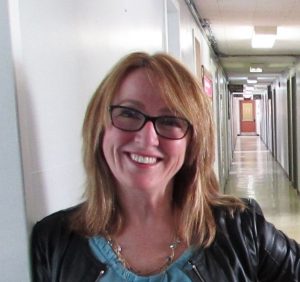By Felicia Massey [1]
BELLEVILLE – Registered nurse and mental-health specialist Debra Lefebvre aims to shed light on mental health during the COVID-19 pandemic as she invites Loyalist students to her free online event this Thursday.
Mental Health During the Pandemic: We Need a Thermometer [2] will be held from 7 to 8 p.m. The goal of the session is to provide students with coping techniques for their school stress, as well as normalizing the overall conversation around mental health.

“We will be meeting with students to acknowledge and validate that their voices are really important,” says registered nurse and mental-health specialist Debra Lefebvre. Photo courtesy of Debra Lefebvre
“Society-wide, mental health has only been amplified and magnified by the pandemic that we’re living in. Some scholars, academics (and) researchers say that we are living in a crisis within a crisis,” Lefebvre told QNet News.
Over the last six years, Lefebvre, who works at Limestone City Mental Health [3] in Kingston, has dedicated herself to the field of mental health as a psychotherapist. Having worked in an acute psychiatric unit, she has experience teaching and facilitating the conversation around mental health.
“Stigma is probably one of the biggest barriers to overcoming our challenges,” she said. “Students refer to accessing mental-health services on campus as ‘the walk of shame.’ ”
Lefebvre said she was happy to be a part of the event for Loyalist students, and that she applauds the school’s understanding of the “alarming need (for) greater education and awareness around mental well-being, particularly now as a result of the pandemic.”
Loyalist College wellness co-ordinator Ryan Stoness agrees with Lefebvre that these unprecedented times have been challenging for students.
“We are in a constant state of change and uncertainty,” Stoness said in an interview Wednesday. “We all as humans crave stability and consistency.”
Stoness works to organize mental-health and wellness events such as Lefebvre’s for Loyalist students. He says these programs have not been used as much as in previous years due to the COVID-19 pandemic.
“So much of the programming that we love to do is done easiest with students on campus.”
Lefebvre also recognizes the effect that the pandemic has had on the lives of students during the transition from in-person to online learning: students, she says, are “forced into a pool where you’re now online learning, you’re socially disconnected, there’s no relationship. We’re social creatures, and that’s all been removed … There needs to be a huge degree of flexibility, sensitivity, compassion and awareness for all of us, students (and) faculty, to not just survive but to thrive in a learning environment.”
Lefebvre says she wants to assure students who attend Mental Health During the Pandemic: We Need a Thermometer, as well as those who may not be able to, that they are not alone on their mental-health journey.
“Everybody is going through some challenges. Reach out: your institution cares about you. Just by the fact that they’ve reached out to bring in an outside consultant to speak with you, speaks volumes,” she says.
“Connect with someone (and) know your support network. That can even be a peer, a dear friend, a member of your community. Social connection is very, very important.”